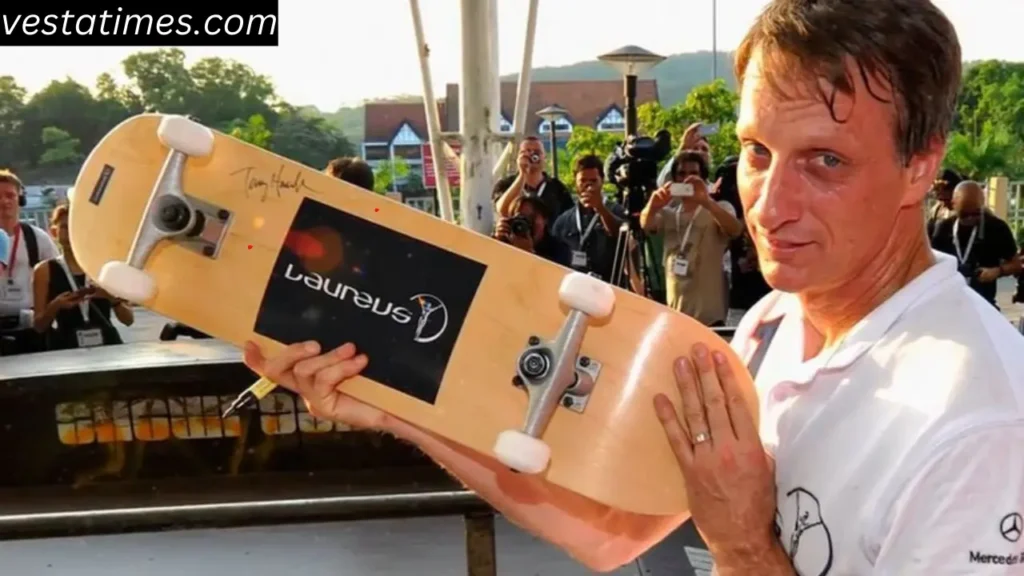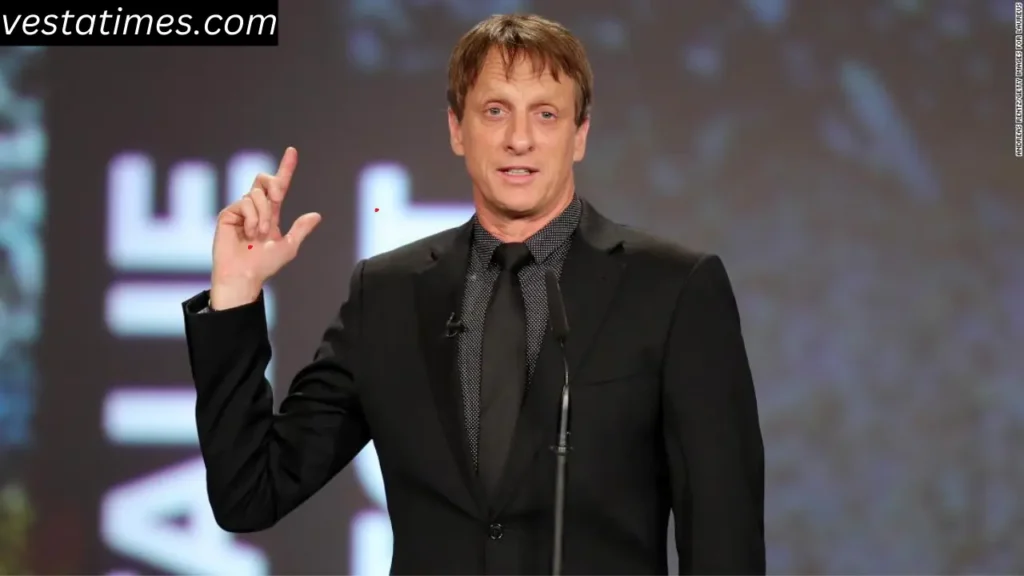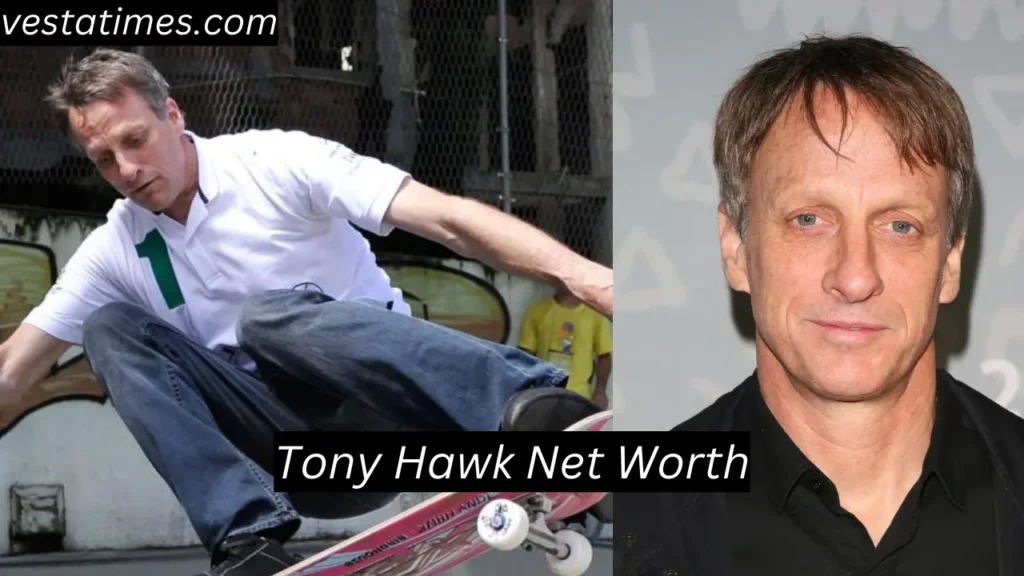Tony Hawk is widely regarded as one of the most influential skateboarders in history. His contributions to the sport have transcended traditional boundaries, making him a global icon. By 2023, Tony Hawk net worth has reached an impressive $140 million, the result of decades of groundbreaking achievements in both professional skateboarding and business ventures. Hawk’s journey from a young prodigy in Southern California to becoming a multi-millionaire entrepreneur is a story of passion, dedication, and smart investments. His influence extends beyond skateboarding into business, philanthropy, and pop culture, making him one of the most successful athletes in history.
Tony Hawk’s career is filled with highlights, from his competitive triumphs to his game-changing “900” trick at the X Games. But his financial success is equally impressive, as he leveraged his fame into successful businesses like Birdhouse Skateboards and the Tony Hawk’s Pro Skater video game series. Today, Tony Hawk is not only a legend in skateboarding but a savvy businessman and philanthropist, making his mark in numerous industries. In this article, we’ll explore Hawk’s journey, how he built his fortune, and the legacy he’s leaving behind.
Early Life and Introduction to Skateboarding
A Skateboarding Prodigy from San Diego
Tony Hawk was born on May 12, 1968, in Carlsbad, California, and grew up in the suburban streets of San Diego. His love for skateboarding started at an early age, and by the time he was nine years old, it became clear that he was no ordinary skater. Hawk’s parents, particularly his father Frank, recognized his passion and provided unwavering support. They encouraged his dreams by driving him to skate parks and competitions, despite the unconventional career path skateboarding offered at the time. This early support laid the foundation for Hawk’s future success.
Hawk’s home life wasn’t without challenges, though. His parents went through a divorce during his childhood, and Tony struggled with ADHD. These factors contributed to his emotional volatility, but skateboarding became his outlet—a way to focus his energy and escape personal difficulties. Hawk credits his family for believing in his potential and helping him find balance as he navigated adolescence.
Early Skateboarding Career
At just 14 years old, Tony Hawk turned professional, marking the beginning of his legendary career. By the age of 16, he was considered the top skateboarder in the world, a title he would hold for over a decade. His prowess in competitions not only brought him fame but also substantial earnings, which was unusual for skateboarding in the early 1980s. Despite still being in high school, Hawk earned over $100,000 a year from sponsorships and tournament victories, making more than most of his teachers. His early financial independence set the stage for his future as a businessman.
Impact on the Skateboarding Community
As Tony Hawk’s star continued to rise, so did skateboarding’s popularity. In the 1980s, skateboarding was still largely seen as a counterculture movement, but Hawk’s success helped to legitimize it as a professional sport. He became a role model for countless young skaters, inspiring a generation to pick up a board and chase their dreams. The California Amateur Skateboard League, where Hawk first competed, became the breeding ground for future stars, many of whom credit Hawk as their inspiration.
Career Milestones

Landing the Iconic 900
One of the most defining moments in Tony Hawk’s career came in 1999 during the X Games, where he made history by becoming the first skateboarder to successfully land the 900—a trick involving two-and-a-half mid-air spins. The crowd erupted in celebration, and Hawk’s achievement became a symbol of perseverance and mastery. Before that moment, Hawk had attempted the trick numerous times but had never been able to complete it. His 900 at the X Games not only cemented his place in the sport’s history but also catapulted him into mainstream fame.
The impact of this feat extended far beyond the skateboarding community. It attracted media attention worldwide, introducing a larger audience to the intricacies of skateboarding. Hawk’s 900 became an iconic moment not just for the sport, but for extreme sports in general, helping the X Games grow in popularity. It also had a direct impact on his personal brand, making him a household name and opening the doors to more lucrative sponsorships and media opportunities.
Tony Hawk’s Dominance in Competitions
In the years leading up to his historic 900, Tony Hawk had already established himself as a force to be reckoned with in the skateboarding world. From the late 1980s through the mid-1990s, Hawk was virtually unbeatable, dominating competitions around the globe. During his career, he amassed 73 competition victories, earning titles such as the World Skateboard Association Champion and X Games gold medalist. His dominance in vert skating, particularly in the halfpipe, made him a legend, and his innovative tricks pushed the boundaries of what was thought possible in the sport.
Hawk’s competitive success also translated into financial success. Prize money, combined with lucrative sponsorship deals from companies like Powell Peralta and Mountain Dew, contributed significantly to his early wealth. His long-standing partnership with Powell Peralta was particularly important, as it helped launch his career and gave him the platform to reach a broader audience.
The Tony Hawk Pro Skater Franchise
Another pivotal moment in Tony Hawk’s career came with the launch of Tony Hawk’s Pro Skater in 1999. The video game franchise, developed by Neversoft and published by Activision, quickly became one of the most successful sports video game series of all time. The game allowed players to virtually step into Hawk’s shoes and perform his signature tricks, bringing skateboarding to a global audience.
The success of Tony Hawk’s Pro Skater was staggering. The franchise sold more than 30 million copies worldwide, generating over $1.4 billion in revenue. For Hawk, the game was not just another endorsement deal; it was a major financial windfall. The royalties from the game continue to contribute to Tony Hawk net worth today, making it one of the most significant contributors to his wealth. The game’s popularity also spurred the release of 10 sequels, further solidifying Hawk’s place in video game history and pop culture.
See Also: Discover Kai Cenat’s $14M Net Worth in 2024 and His Rise to Fame!
Expanding into Business Ventures
Birdhouse Skateboards
One of Tony Hawk’s earliest business ventures was the creation of Birdhouse Skateboards in 1992, alongside fellow skater Per Welinder. At the time, skateboarding was in a lull, and many believed that the sport had peaked. However, Hawk saw potential in starting his own brand, one that would cater to the new generation of skaters. While Birdhouse initially struggled to gain traction, the resurgence of skateboarding in the late 1990s, coupled with Hawk’s growing fame, turned the company into one of the leading skateboard brands.
Today, Birdhouse Skateboards is a top name in the industry, selling millions of decks, apparel, and accessories. The company’s success is a testament to Hawk’s vision and business acumen, and it continues to be a key source of his income. Birdhouse’s impact on the skateboarding industry cannot be understated—it has helped shape the culture and style of modern skateboarding, and its products are sought after by both professionals and amateurs alike.
Hawk Clothing and Sporting Goods
In addition to his skateboarding company, Tony Hawk ventured into the world of fashion with the launch of Hawk Clothing in 1998. The brand quickly became popular among skaters and fans of the sport, offering a range of apparel that reflected the skateboarding lifestyle. Hawk Clothing was sold in major retail stores, giving the brand widespread visibility and helping Hawk establish a foothold in the fashion industry.
Hawk also expanded his empire into sporting goods with his Tony Hawk Signature Series, which includes skateboards, helmets, pads, and other accessories. These products are designed for skaters of all skill levels, from beginners to professionals. By diversifying his product offerings, Hawk was able to capitalize on his brand and create multiple revenue streams, all of which contributed to his growing fortune.
Licensing and Endorsements
Over the years, Tony Hawk has entered into numerous licensing deals and endorsement partnerships, further increasing his wealth. His image and name have been licensed for use on everything from clothing to energy drinks, and he has appeared in commercials for major brands like Nissan and Subway. These deals have not only added to his financial success but also helped to keep his brand relevant in the ever-changing world of sports and entertainment.
Tony Hawk’s ability to maintain a strong personal brand for more than three decades is rare in the sports world. His ventures into business and endorsements demonstrate his keen understanding of how to leverage his fame for long-term success. These licensing and endorsement deals bring in millions of dollars annually, solidifying his place as one of the wealthiest athletes in history.
Personal Life and Philanthropy

The Tony Hawk Foundation
While Tony Hawk’s professional success is well-documented, his work in philanthropy is equally impressive. In 2002, Hawk founded the Tony Hawk Foundation, an organization dedicated to building public skateparks in underserved communities. The foundation’s goal is to provide young people with safe, legal places toexpand access to skateboarding facilities and promote a healthy, active lifestyle. Since its inception, the Tony Hawk Foundation has awarded over $10 million in grants, helping to build more than 600 skateparks across the United States and abroad. These parks serve as safe havens for young skaters and have had a positive impact on communities, offering an outlet for creative expression and physical activity.
In recognition of his efforts, the foundation was renamed the The Skatepark Project in 2020, as it continued to evolve and expand its reach. Hawk remains deeply involved in the organization, attending events and raising funds to further its mission. His philanthropic work is a testament to his desire to give back to the sport that gave him so much, and it has cemented his legacy as not just a businessman, but a philanthropist as well.
Personal Life and Family
Tony Hawk has been married four times and has four children, including Riley Hawk, who followed in his father’s footsteps and became a professional skateboarder. Despite his busy professional life, Hawk has always prioritized his family and has often spoken about the importance of balancing his career with fatherhood. Hawk’s personal life has seen its share of ups and downs, but he remains committed to his family and to the skateboarding community that has supported him throughout his life.
Beyond his family, Hawk has maintained a strong connection to his roots in Southern California, where he still resides. He continues to skate regularly and remains a central figure in the skateboarding world. His passion for the sport is evident in everything he does, from his business ventures to his philanthropic efforts.
See Also: Katt Williams Net Worth 2024: How He Built His $10M Comedy Empire
Tony Hawk’s Legacy
Skateboarding’s Mainstream Success
Tony Hawk’s contributions to skateboarding go far beyond his competitive achievements. He played a crucial role in transforming skateboarding from a niche activity into a mainstream sport with global appeal. His influence helped bring skateboarding into the Olympics in 2020, where it was featured for the first time as an official event. Hawk’s success paved the way for future generations of skateboarders, who now have more opportunities than ever before.
Hawk’s ability to cross over into mainstream pop culture has also made him a true cultural icon. From appearing in movies and television shows to being immortalized in action figures, Hawk’s impact on popular culture is undeniable. He has used his platform to advocate for the growth of skateboarding, and his efforts have paid off as the sport continues to grow in popularity worldwide.
Influence on Extreme Sports
In addition to his influence on skateboarding, Tony Hawk is credited with helping to elevate the status of extreme sports as a whole. Through his participation in events like the X Games, Hawk introduced millions of people to the world of extreme sports, which includes BMX, snowboarding, and motocross. His success helped to legitimize these sports, paving the way for future athletes to pursue careers in non-traditional sports.
Today, extreme sports enjoy a level of visibility and respect that would have been unthinkable when Hawk first started skating in the 1980s. His contributions to the rise of these sports cannot be overstated, and his legacy will continue to inspire future generations of athletes.
Lasting Impact on Business
While Tony Hawk will always be remembered as a legendary skateboarder, his success in business is equally impressive. From his Tony Hawk’s Pro Skater franchise to his various entrepreneurial ventures, Hawk has proven himself to be a savvy businessman with a keen understanding of branding and marketing. His ability to transition from professional athlete to successful entrepreneur is a rare feat, and it has set him apart from many of his peers.
Hawk’s influence extends far beyond skateboarding and extreme sports—he has become a symbol of how athletes can leverage their fame and success to build lasting careers outside of sports. His ventures have not only contributed to Tony Hawk net worth but have also helped shape the way athletes approach business.
Conclusion
Tony Hawk net worth, currently estimated at $140 million, is a testament to his enduring influence and success. From his early days as a skateboarding prodigy to his current status as a business mogul and philanthropist, Hawk has proven time and again that his impact reaches far beyond the skatepark. His ability to innovate, both on and off the board, has allowed him to maintain his relevance and build an empire that extends into entertainment, fashion, and philanthropy.
Tony Hawk’s legacy is one of perseverance, innovation, and giving back. He has inspired generations of skateboarders, helped transform extreme sports, and used his success to benefit others through his charitable efforts. As skateboarding continues to grow in popularity, Hawk’s contributions to the sport will never be forgotten, and his financial success serves as a model for athletes everywhere. Tony Hawk net worth is not just a number—it’s a reflection of a life well-lived, filled with passion, hard work, and a desire to make the world a better place.
FAQs
How much is Tony Hawk net worth in 2023?
As of 2023, Tony Hawk net worth is estimated to be $140 million, largely due to his successful skateboarding career, video game franchise, and numerous business ventures.
What is Tony Hawk’s most famous trick?
Tony Hawk is best known for landing the 900, a trick that involves completing two-and-a-half mid-air spins. He successfully performed it at the 1999 X Games, a moment that solidified his place in skateboarding history.
What are Tony Hawk’s main sources of income?
Tony Hawk’s wealth comes from various sources, including his Tony Hawk’s Pro Skater video game series, sponsorships, his company Birdhouse Skateboards, and several entrepreneurial ventures. He also earns through endorsements and royalties from licensing deals.
Does Tony Hawk still skateboard?
Yes, despite his age, Tony Hawk continues to skateboard and is still active in the skateboarding community. He regularly participates in demonstrations, events, and continues to innovate in the sport.
What is the Tony Hawk Foundation?
The Tony Hawk Foundation, now known as The Skatepark Project, is a charitable organization founded by Hawk in 2002. The foundation helps build public skateparks in underserved communities, providing youth with safe places to skateboard.
Has Tony Hawk ever acted in movies or TV shows?
Yes, Tony Hawk has made several appearances in films and TV shows, including cameo roles in Jackass: The Movie, The Simpsons, and Rocket Power. His contributions to popular culture extend far beyond the skateboarding world.



